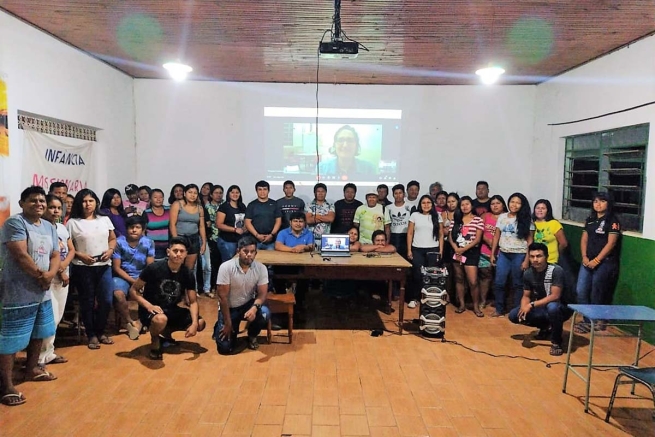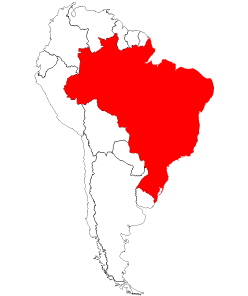BRAZIL: Indigenous students access distance learning

UniSalesiano develops its first distance learning center in the village of Meruri
(MissionNewswire) UniSalesiano, the Salesian University in Araçatuba, Brazil, has developed a distance learning center in the village of Meruri, more than 900 km (approximately 560 miles) from the university’s main campus. This new center is part of a larger education extension project launched by Salesian missionaries in the Indigenous communities of Meruri and São Marcos in the Brazilian state of Mato Grosso. The new center will provide education to 46 Indigenous Boe-Bororo people.
The first online lecture took place on the evening of Sept. 12, when students gathered to hear a talk by Professor Elaine Cristina Moreira da Silva, the distance education course coordinator. The lecture was also virtually attended by Professor André Ornellas, vice chancellor for teaching, research and postgraduate studies, who explained the history of the university and the importance of taking an academic path. He said, “Bringing education, technology, and providing opportunities for personal and professional growth is part of the mission of the Salesians.”
Moreira da Silva explained that the course is free, lasts four years and is organized by semester with weekly meetings on Mondays. She added, “It provides specific modules and adaptations to meet the specific needs of this audience, always following the national curricular guidelines, which are presented for the pedagogy course.”
The idea for the new educational center came from a discussion among Father Erondi Tamandaré, director general of UniSalesiano, Father Andelson Dias, director of the Indigenous missions of Meruri and São Marcos, and Father João Bosco, provincial secretary. Fr. Tamandaré said, “We felt the need for continued and strengthened collaboration with Indigenous peoples.”
The goal is to add additional distance learning centers in other villages. Fr. Andelson stressed the importance of training youth and adults who desire a degree despite the many obstacles. He said, “Many Indigenous people go to the cities to study, come back, and help their people. However, in the cities, there are many difficulties, and we noticed that many were coming back and there was discouragement due to the discontinuity of studies. In addition to knowledge gained, they will be able to practice their profession, which is of fundamental importance to the entire Boe-Bororo community.”
Salesian missionaries in Brazil provide education, workforce development, and social services throughout the country and specifically focus on children with disabilities within several programs. Missionaries help to meet the basic needs of poor youth, including street children, and provide them with an education and life skills to gain employment, break the cycle of poverty, and lead productive lives.
According to the World Bank, the COVID-19 pandemic has had a devastating impact on Brazil with poverty tripling in 2021. Nearly 17 million people fell into poverty in the first quarter of the year and the poverty rate now is higher than it was a decade ago. Researchers estimate that 12.8 percent of Brazil’s population, some 27 million people, are now living below the poverty line.
###
Sources:
ANS Photo (usage permissions and guidelines must be requested from ANS)
ANS – Brazil – Hub for distance education of indigenous people of village of Meruri developed
Salesian Missions – Brazil
World Bank – Brazil





